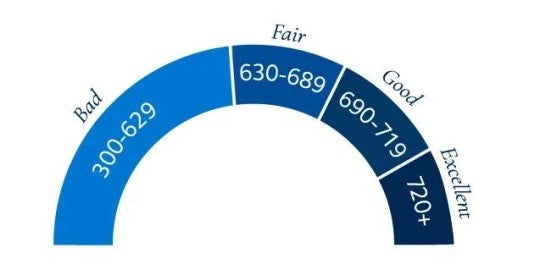Your credit, credit score, and credit report all work together to help you invest, save, and reach your financial goals.

Credit, credit scores, credit reports: They’re all interconnected pieces of a puzzle. Once they fit together, those credit essentials can help reach your big-picture financial goals—things like rent an apartment, get a credit card, and buy a house.
But knowing how the credit, credit score, and credit report fits together means understanding how to positively (and negatively) impact all three. Here’s what you need to know so you can make the best money decisions, big and small, for you.
Credit is simply your ability to borrow money, from obtaining a car loan or qualifying for a credit card. To get access to credit, you typically have to apply for it. A bank or a lender will evaluate that application and, if approved, offer a specific amount you can borrow. Then, legal documents (which you sign) clearly map out how the relationship works, including the interest rate you'll pay and your monthly commitment. Your minimum monthly payment will typically be either a fixed amount (like $25) or a percentage of your total loan (like 2% of what you borrowed). This makes it easier to plan your budget and stay on track with payments.
Credit isn’t free; there are always costs such as interest rates, conditions, or fees. And the credit that you’re able to obtain (and the credit limit on things like a credit card) changes over time. Typically, it grows as you increase your income and demonstrate your ability to regularly pay it back.
Think of a credit score as a report card for your finances. It is a number that measures how well you’ve been able to borrow and repay money—in other words, whether you pose a risk to lenders, can reliably pay your bills, or can pay back money you borrow. The higher your credit score, the lower the perceived risk you pose.
Credit scores are made up of a variety of finance-related factors including:
- Bill paying habits: Do you pay your bills on time?
- Credit utilization: How much of your credit do you use?
- Credit age: How long have you had credit, and how old are the debts you have?
- Credit mix: What types of credit—a loan, a credit card, for example—do you have?
- Credit requests: How often and when have you applied for new credit?

Credit scores can range from a low of 300 to a high of 850. Two companies—FICO and VantageScore—calculate credit scores and weigh credit score factors slightly differently. (That’s why you might see variation if you pull a credit report from different sources or at different times.) Scores also change frequently. In general:
- 300–629: Bad
- 630–689: Fair
- 690–719: Good
- 720+: Excellent
If you have a credit card, you may have access to a free credit score at any time; check your statement or contact the credit card company to find out. If not, you can generally find your credit score on your credit report (see below) or from your bank.
Credit scores don’t just impact whether you’re able to get mortgages and car loans. Your credit score directly impacts the interest rate a lending institution offers. The lower your credit score, the more you’ll pay for those loans.
But a credit score isn’t a fixed number. Although it takes time, you can improve your credit score by focusing on the factors that affect it. For example, you can:
- Pay your bills on time. Set up automatic payments and pay everything within 30 days.
- Lower your credit utilization. Use a smaller percent of the credit available to you. Aim to keep that to less than 30% of your available revolving credit (credit cards, for example).
- Increase the age of credit but decrease lingering balances. Pay off your credit in a timely manner—no long-term credit card balances, for example.
- Build a credit mix. Use credit two ways: Revolving debt and installment debt. Revolving is debt you pay off as it accumulates; a credit card is the best example. Installment debt has set terms for payment amount, date, and length of loan; think of a car loan. Having both types of credit can improve your credit score.
- Limit credit requests. Avoid lots of new applications, particularly if you’re close to applying for a big loan.
A credit report is a moment-in-time snapshot of your credit history and outlook. It’s used by a credit bureau to create a credit score, which (as noted above) impacts your ability to secure new credit or qualify for lower interest rates and may equal a lower cost of borrowing over time. Potential landlords may also pull a credit report before agreeing to rent to you, too.
A credit report includes personal information (name, birthdate, address) and a summary of credit accounts (types, date opened, limits/total loan, balance, payment history). It will also distinguish between credit inquiries. Soft inquiries, such as when you check your credit report, have no impact on your credit score. Hard inquiries, however, such as applying for credit or loans, may have a temporary negative impact on your credit score.
A credit report is a valuable tool for your overall financial health. It can alert you to mistakes, such as bills you paid off. It can also signal potential identity theft, if there are accounts that you have not created but have a balance.
Good news: You can get a copy of your credit report once every 12 months—for free. Simply visit annualcreditreport.com to request a copy. When you receive it, check all the information to ensure it’s accurate. You can also request a credit report each year from Equifax, TransUnion, and Experian; each of those companies are required to provide you with an annual copy at no charge.
If you find mistakes on your credit report, you have a couple of options. Start with the credit bureau: File a written dispute (search to see if they offer a form to use). You’ll have to send it and any documentation you have by mail; certified is best. Follow the same procedure with the lending company or business reporting the error. Finally, use resources at identitytheft.gov to report ID theft.
Remember:
- Practice good credit habits, such as paying all your bills on time.
- Pull your credit report for free once a year; add a reminder to your calendar. Report any errors immediately
Log in to your Principal account to assess your retirement savings rate so you can see how much progress you’re making toward your goals. Don’t have an employer-sponsored retirement account or want to save even more in addition to a 401(k)? We can help you set up your own IRA or Roth IRA.


